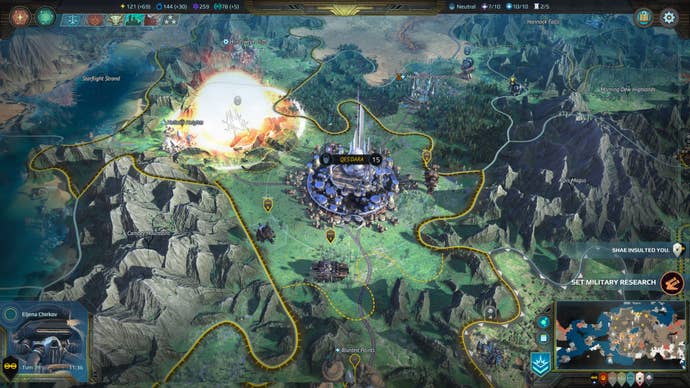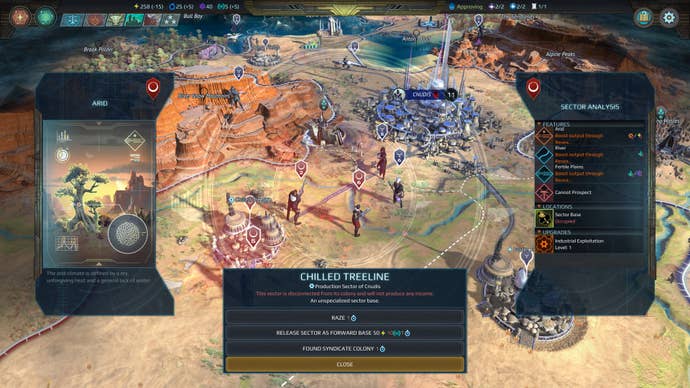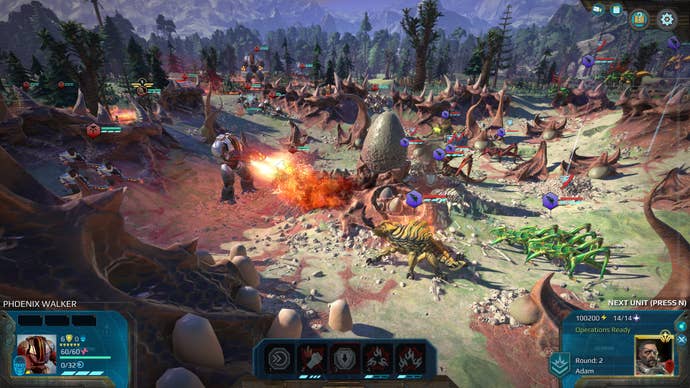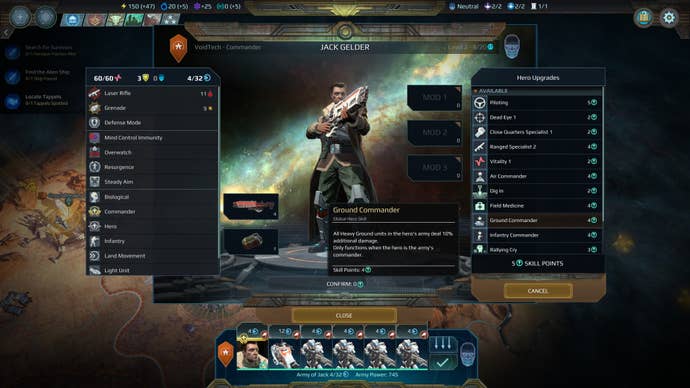Age of Wonders: Planetfall Review
Triumph Studios brings two great genres together once again.
This article first appeared on USgamer, a partner publication of VG247. Some content, such as this article, has been migrated to VG247 for posterity after USgamer's closure - but it has not been edited or further vetted by the VG247 team.
I admit, I was not looking forward to Age of Wonders: Planetfall. I'm a big fan of Triumph Studios' last outing, Age of Wonders 3. Across the original release and two major expansions, the studio crafted an excellent 4X experience. But after three previous titles have been firmly within the fantasy genre, Age of Wonders: Planetfall is taking the series into science fiction territory, which I felt was a misstep. Firaxis' Civilization: Beyond Earth already mined the science fiction side of the genre and I thought leaving fantasy behind was ceding one of Age of Wonders' selling points to Amplitude Studios' Endless Legend. (Oddly enough, Age of Wonders 3 came out in 2014, the same year as the aforementioned games.) Triumph Studios had to prove that the magic of Age of Wonders would survive the change in setting.

Building an Empire
I shouldn't have worried, because gameplay wins out every time, and Age of Wonders: Planetfall even retains enough of the fantasy feel to keep me happy. If you've never played any of the Age of Wonders titles, the series occupies the space in-between Civilization and XCOM. The core is the 4X genre, with players colonizing and specializing cities, and growing territory in order to gain a leg up over their opponents. You'll establish cities, exploit the landscape, research new technologies, trade with civilizations, and maybe even get in a little espionage.
Planetfall changes up the Age of Wonders system by establishing a new mechanic. Instead of your border slowly growing through population and influence, the overworld map is divided into discrete chunks called Sectors. Your cities can't be directly adjacent to one another, and border growth is done by annexing an adjacent free sector to a specific city. This changes your establishment and expansion strategy, because you have to think not only of the primary sector a city is on, but the strengths of nearby sectors as well. Each city can have specializations, which are the focus of its labor—Food, Energy, Production, or Knowledge—but only one specialization at a time is allowed for an annexed sector.

Sectors means expansion is much faster in Age of Wonders: Planetfall than other 4X titles. The idea of sectors also changes how intercity conflict works, as you can cut off sectors to starve a specific city of resources. In other titles, you'd usually have to attack a city or upgrade directly to cripple a city. In Planetfall, taking the right sector can bring a city to its knees. Sectors also mean that each specific hex of the overworld map is less important, lowering some of the micromanagement. It's a shift in speed, one which increases the pace of the early game. I appreciate the change, as it gets through the tedium and gets into the double-dealing, negotiation, and fighting.
Planetfall does have the older Civilization problem where the cities themselves are painfully straightforward in composition. You will build each city to the best structures you've researched, while also taking into account their current exploitation. This means finishing certain tech research will have you going to each city to upgrade to the new building type in rote fashion. The more in-depth city planning of Endless Legend or Civilization 6, where structure placement matters, is unfortunately not available here. I wish there was more to city planning, perhaps in terms of outposts or something similar.
Destroying Your Enemies
Combat is the strongest part of Age of Wonders: Planetfall. Unlike many 4X titles, Age of Wonders' combat does not automatically resolve in mathematical simulations counting whether your units are stronger than your opponent's army. Instead, you take to the battlefield in hex-based turn-based strategy. This is the XCOM side of things, with mechanics like cover and Overwatch allowing you to have a firm control over a battles outcome. It makes positioning and attacking with multiple units on the overworld map matter, as they appear on the battlefield in roughly the correct position. If you pincer an enemy on the overworld map, when combat starts your units will surround them on either side.
You can autoresolve combat, making it play in simulation like other 4X titles, but that's usually a bad idea. Your units tend to take far more damage than they would under your control, meaning you're more likely to lose soldiers. Even when you're overwhelming the enemy, it tends to be better to play out the combat. The ability to directly control the outcome of combat is where Planetfall, and Age of Wonders period, shines. A savvy player can overcome a deficit in power with proper tactical planning. That's also helped by a fairly detailed procedural map generator, which creates new battlefields filled with cover and destructible objects that encourage strategic thinking on the fly. The maps themselves also happen to look damned good, with locations like forests, plains, nests, and ruins feeling almost like they were hand-crafted.
If the building is pretty straightforward, army management is anything but. There are so many different units and army types available to players in Age of Wonders: Planetfall. The units available to you in each game stem from your race and technology choices. There are six races in Planetfall, each of whom can use two different weapon types and have their own unique perks. The Vanguard are standard humans, who are stronger at range via the use of drones and turrets. The Dvar, who might as well be space dwarves, focus more on production and offer strong terraforming options, while the Assembly are techno-zombies, who can bring back fallen units as soldiers or resources.

Then come the six technology choices, which are more battlefield focused and break down to the classes in previous Age of Wonders games. If you pick up Promethean tech, you can settle in harsher environments, and you have access to powerful army-clearing explosives. Voidtech is based more on trickery, letting units teleport around the battlefield and slow down their foes. Xenoplague is all about evolution, letting you transform units, heal your soldiers, and utilize bioweapon poisons to weaken opponents. Together, race and tech choices offer you 36 different starting points, and that's before you get into things like vices and backgrounds.
Depending on your starting choices and which technologies you research, the units available to your army only grow as a game persists. I play games in the 4X genre on a regular basis, and compared to others, the number of units here almost feels like too much. By my count, there's 223 units, compared to something like 76 for Civilization 6; there's some overlap in unit type, but they all have distinct capabilities. And that's before you get to equippable mods, which also change each unit and allows for direct micromanaging. There are also Heroes, units unique to each race. These characters have more power and skills than normal units, can utilize special hero-only equipment to improve their abilities, and have access to hero abilities. For instance, some Dvar heroes can walk right through battlefield obstacles, while an Amazon hero could buff the damage of all units within a certain range. Some even get special vehicle and mounts. You have to protect your heroes to a certain degree, as depending on your game settings they're at risk; by default, your lead heroes will return after a brief sabbatical, while others are gone for good.
Finally, there are Operations, where Age of Wonders' spell system has ended up. Operations are split between Strategic Operation (which are done on the overworld map), Tactical Operations (which are done in combat), and Doctrine Operations (which affect your civilization). A Doctrine might see your units healing per enemy unit killed, or allow you to pacify conquered colonies quicker. Tactical Operations are things like Firestorm Projectile, which calls in an airstrike that leaves the affected battlefield tiles burning, or Protective Growth, which summons roots to heal and protect a friendly unit. Strategic Operations let you attack colonies publicly or covertly, like fabricating atrocities to lower another civilization's reputation or blinding a colony in a shroud of darkness, making it harder for the colony to mount a counterattack. This adds tactical option for the players, and divorces the "spells" from specific units, but it loses some of the simplicity of the earlier spell system.

Information Overload
If this sounds like a lot, it is. One of Age of Wonders: Planetfall's problems is that there's so much, that it's difficult to onboard new players. There's a brief tutorial campaign, helpful tooltips from your AI guide AIVA, and the Imperial Archives with detailed reports on every mechanic, but you have to be willing to search that stuff out. Sometimes it's hard to see how one mechanic effects another, or whether a certain technology will lead you down the right path. Early on, I was trying to improve city morale, but I had to hunt around the tech tree to figure out which tech would help me. For a new player, I could see the initial wall to getting into Planetfall being rather high.
There are some other issues with combat in Planetfall. Battles max out around 42 units, and though it's quite rare, when it does happen, you might rethink just auto-resolving combat because it can take forever. Ranged units also seem much stronger than melee units, as they can drop damage in before melee units can even get in range; Triumph tries to make up for this with Melee Overwatch, which prevents units from leaving melee range without taking a free hit, but doing damage early is usually better overall.
I admit, the problems of complexity and unit balance aren't unique to Age of Wonders: Planetfall. These are just different versions of the problems I've seen in its competitors as well, like Civilization 6, Galactic Civilizations 3, and Endless Legend. And Planetfall's unique mix of colony expansion and tactics combat allows for it to stand out in the crowd, on top of some fairly compelling writing in its campaign. And given how much Age of Wonders 3 improved from its initial launch, I'm looking forward to seeing what Triumph Studios does here. This is a fantastic start for a new Age of Wonders, and if you're looking for a new 4X with a focus on combat, this is your game.
ConclusionTriumph returns to its unique mix of Civilization and XCOM with the new Age of Wonders: Planetfall. Leaving behind the fantasy trappings of the previous games, Planetfall heads into sci-fi territory. The new colony system speeds up play and allows for interesting options for hobbling your opponent's cities, and the combat system is blown way out, with combinations of race, technology, research, and unit mods allowing for a dizzying array of army choices. In fact, Planetfall's biggest problem will likely be onboarding new players because of its density. If you're up to the challenge though, Planetfall is a worthwhile entry point into the series.


